Why the 7 Mountain Mandate is Toxic Theology
Originally written circa 2016 and edited for context in early 2024
For years, I tiptoed around talking about a prevalent teaching in independent charismatic circles that has become so pervasively woven into the power structures it inhabits that it is held sacrosanct.
A given. A cornerstone. A self-evident truth rather than a debatable, deeply-flawed theological model not supported by the teachings or life example of Jesus.
I wrote the bulk of this in 2016-2017 and could not have imagined what was to come over the following years. Given where we are as a nation (in the USA) in 2024, I feel the stakes have never been higher.
The Seven Mountain Mandate. Yes, friend, we are indeed going there.
For ease, I will use the abbreviation 7M interchangeably.
But before we go further, let’s look at what exactly 7M theology is and define our terms.
In case you’re unfamiliar with what I’m talking about, here are the basics. I even drew some pictures.
What is the Seven Mountain Mandate?
In this belief framework, the kingdom of God and the great commission (often referenced from Matthew 28:16-20) are tied to taking certain mountains of culture and expanding the overarching presence of the “mountain of God”.
There are 7 mountains of cultural influence (pictured above) and the goal is to scale to the top of the mountain you are called to be a leader on, so you can, as a Christian, be in charge and thus effect change from the top down.
(The leadership model inferred here is a whole series unto itself.)
Leaders at the top have the power to set agendas and enforce values that will bring “God’s kingdom values” in that area of cultural influence. On earth as it is in heaven. Literally.
(But not really. At least not according to Jesus’ description. We’ll get to where I explain that in the next sections.)
I heard Lance Wallnau, the founder of this iteration of this theology, state the following in a recording I listened to circa 2015-2106 (around when this piece was first written) I wish I still had a copy of: “Those 7 Mountains of influence are so powerful that he who occupies the top of those mountains can literally shape the agenda that forms nations.”
I replayed the segment a few times to make sure I had heard what I thought I heard.
(But for the sake of argument because I don’t have the exact recording saved, this is my transcription of what I heard and believe to be accurate to the best of my ability.)
Seven mountain teaching isn’t about building God’s Kingdom. It’s about building our kingdom in God’s name. It’s an insidious, sneaky, tangential teaching rooted in dominionism1 which is seen reflected in phrases like “taking our nation back for God”.
(Contrary to popular opinion, I don’t believe God ever lost anything. Or needs our help in retrieving it.)
Basic Objections to the 7 Mountain Mandate
But what’s so wrong with wanting to see transformation come to society? And doesn’t God care about these areas too?
Absolutely God cares. I deeply believe God calls us to be involved in loving our communities, and loving our neighbors because they are already beloved. But this is not that.
The 7M ideology is subversive to the call of being present with, causing many to run after positional and transactional leadership rather than seeking transformational leadership based on the hard work of building relationships.
Biblical leaders don’t ascend some heavenly corporate ladder by trying to become king of the cultural hill. They go low, serve in unseen places, and prioritize people.
Isn’t calling this toxic a bit strong Michele? That’s kinda stern language.
Friends, it NEEDS to be strong. And here’s why.
A toxin is a poison produced by living cells capable of causing disease and harm when introduced to the body.
Toxic theology produced by living cells (people, many times leaders) in the Church makes the Church sick to the degree it ingests it.
The 7 mountain mandate assumes that leadership is about “rulership” and exerting control from the top down to affect change.
It is a power-over, authoritarian model of leading that celebrates taking dominion from the high place to “set the agenda that forms nations.”
Side note: I am simplifying things a good bit. Not everyone believes or applies these beliefs in equal intensities. There is a range like most things in life. But even in small degrees, this teaching can be subversive to the actual kingdom of God that Jesus spoke of and walked out.
Jesus told his disciples, “You know that the rulers of the Gentiles lord it over them, and those who are great exercise authority over them. Yet it shall not be so among you; but whoever desires to become great among you, let him be your servant. And whoever desires to be first among you, let him be your slave…” Matthew 20:25-27
The Greek word translated as “lord it over” is katakyrieuō. Its meaning can be translated as exercise dominion over, overcome, exercise lordship over.
Hi. Houston, we have a problem.
In a very real sense, 7M theology is colonialism dressed up in different clothes.
The goal for many who adhere to this teaching often becomes to seize the seat of power and force what they think the Kingdom of God SHOULD look like in their mountain of culture.
And for those of us who call the USA home-sweet-home and cherish things like first amendment rights, the most extreme application of 7M doctrine ironically lauds reinventing the very thing our founders were fleeing from.
Religious authoritarianism and theocracy.
That is a whole ‘nother kettle for a whole other set of posts. We’ll get there.
Empire building is not transformational.
Taking a “cultural mountain” is not about discipling nations, it is about dominating them.
Outward conformity to a system of behavioral rules, doesn’t indicate a genuine inward change of heart.
True transformation never comes from the top down. It always comes from the inside out.
Mountains & God’s Upside Down Kingdom
As I became more and more aware of the prevalent application of this teaching and saw the leadership culture it gave rise to, the whole analogy began to break down for me.
I spent the bulk of 20 years in circles where this was an underlying assumption and a foundational part of organizational core purpose and identity.
It was infused into almost every sermon and teaching. Even if unmentioned, it was still there. To question it, was to question the very system it supported.
So if you are in a place where reading this is like, uh-oh, now-what-do-I-do, hang with me here just a little longer. I know this might be scary, but it is so very vital. You aren’t alone.
And if you are like, well who could ever believe that nonsense? I get it. It sounds so out there. Cue Twilight Zone music.
But what may be fringe for you, is central for many. And it is shaping culture in monumental ways.
Regardless where you are in relationship to this teaching, we’ve all come through 4 years of a US presidency largely enabled by it. (2016-2020)
Mic drop.
One day in 2011-2012, I was getting increasingly bothered by what I was seeing. Thinking, Why am I so bothered by all this?”
I’m a really visual person. So, when an idea clicks for me, often it’s because I mentally see a metaphor or a word picture. I’m the girl whose notes are mindmaps and sketchbooks.
I started to wonder, what if this 7M shindig was inverted, where the low place became the high place and the high place the low place. In Jesus’s teaching of upside-down power dynamics, that made way more sense to me.
It seemed much closer to the heart I see reflected in Jesus’s own life and story.
So in this model, instead of fighting to be rulers, the greatest influencers become servants. They “scale” the mountain by serving and intentionally building relationships in a power-under stance of service. The high place becomes the low place and the low place the high place of influence because of love-rooted servant leadership.
This upside-down mandate seemed way closer to the heart of Jesus. As a metaphor, it became something I held onto and shared on occasion.
A few years went by and this topic settled on one of my mental shelves.
I honestly did not give much thought again until I was back living in the USA, watching how the evangelically aligned church positioned itself politically.
That led to deep heart-searching and hard questions for me.
When everything culminated in 2016 with the election’s outcome and all that followed, I could not reconcile the things that unfolded as a practical outworking of the kingdom Jesus spoke of and taught.
The Way We Think Matters
One of the topics that captured my interest in my grad school research was the very nerdy subject of “generative metaphors”.
The basic idea is that the way we think about a topic and the metaphors we use to frame our understanding, the stories we tell ourselves and one another give rise to or generate the reality, behavior, and normative culture surrounding that subject matter.
Is conflict a prize fight where we take our gloves off, risk injury, and celebrate victory after winning?
Or is conflict a dance where each party has a valuable part to play and the goal is to move together beautifully, powerfully in relationship?
Because much of my research and study delved into organizational storytelling, I was prompted to go back and seek out other metaphors that Christians have used to speak of community-level change and transformation.
I landed squarely on the imagery and metaphors Jesus himself used to describe God’s kingdom. The only time mountains were mentioned in his narrative was when he climbed them to get alone to pray.
His teaching had nothing to do with engaging cultural mountains. It was about being salt and light. Transformative. Not legislative. Community influence from the inside out, not cultural domination from the top down.
Wait, wait Michele… It’s the same thing. It’s just semantics and imagery. Why are you splitting hairs over this?
Because it is truly worlds apart. Let me show you.
Imagine this sphere represents your community. You don’t scale a sphere and mandate change from the top down. You show up, build genuine, real relationships rooted in mutual trust from within, and see change come together from the inside out.
You aren’t coming to conquer or colonize. You’re showing up to serve and be love with skin on.
Let’s line these two perspectives up so we can see the differences.
Do you see how powerful and important how we choose to think and communicate is?
Our words frame our worlds.
The Example of Jesus
One of the greatest challenges to the 7M theology is the life of Jesus himself. He was born into a world desperately looking for a political leader.
If the understanding of cultural mountaineering and political takeover was foundational to God’s Kingdom coming, Jesus would have given us a different model to follow.
Instead, we read, the only mountain Jesus scaled was to pray and remove Himself from those trying to force Him to take power through political force.
Therefore when Jesus perceived that they were about to come and take Him by force to make Him king, He departed again to the mountain by Himself alone. – John 6:15
If we dig deeper and think about the metaphors Jesus used to talk about change and transformation, they were about inside-out transformation, not power-over domination.
Yeast causes changes from inside the dough. Light changes things by showing up in the middle of darkness. Salt affects transformation by simply being present in the situation.
And finally, at the end of Jesus’ life when he stood before Pilate, he could not have been more clear about the nature of how God’s kingdom came.
Jesus answered, “My kingdom (sovereignty & royal power) is not derived from this world (or it’s inhabitants). If My kingdom were of this world, My servants would fight, so that I should not be delivered to the Jews; but now My kingdom is not sourced from this realm.” – John 18:36
Politics and policy don’t change people’s hearts.
Trying to manipulate and legislate fallible human interpretations of what is believed to be God’s will is nothing less than demanding a spiritualized version of our own understanding rooted in our own strength.
If God’s kingdom's coming was determined by cultural dominance, political power, and social esteem, Jesus was the universe’s most epic failure.
His own culture crucified him. His greatest platform was realized in a criminal death sentence on a Roman cross.
Jesus said:
“The kingdom of God does not come with observation {careful scrutiny and visual evidence}; nor will they say, ‘See here!’ or ‘See there!’ For indeed, the kingdom of God is within, among, and inside you.” (Luke 17:20-21)
For those of you who find yourself in these words, I hope you find the courage to ask hard questions.
For those of you hurt by the culture wars waged in Christ’s name, I ask your forgiveness for the assumptions made, the accusations hurled, and the shame weaponized by spiritual arrogance.
I want this to be a truly safe space where you are welcome. Just as you are. No ifs, ands, or buts. No qualifiers or trying to squish yourself into a mold you were never created to fill.
Just messy, imperfect, open-hearted belonging.
Love you deeply friends.
Dominionism: While I rarely would use wikipedia as a source, this is a fairly accurate description— “Dominion theology is a group of Christian political ideologies that seek to institute a nation governed by Christians based on their understandings of biblical law. Extents of rule and ways of achieving governing authority are varied. For example, dominion theology can include theonomy, but does not necessarily involve advocating Mosaic law as the basis of government. The label is applied primarily toward groups of Christians in the United States… Most of the contemporary movements labeled dominion theology arose in the 1970s from religious movements asserting aspects of Christian nationalism.”





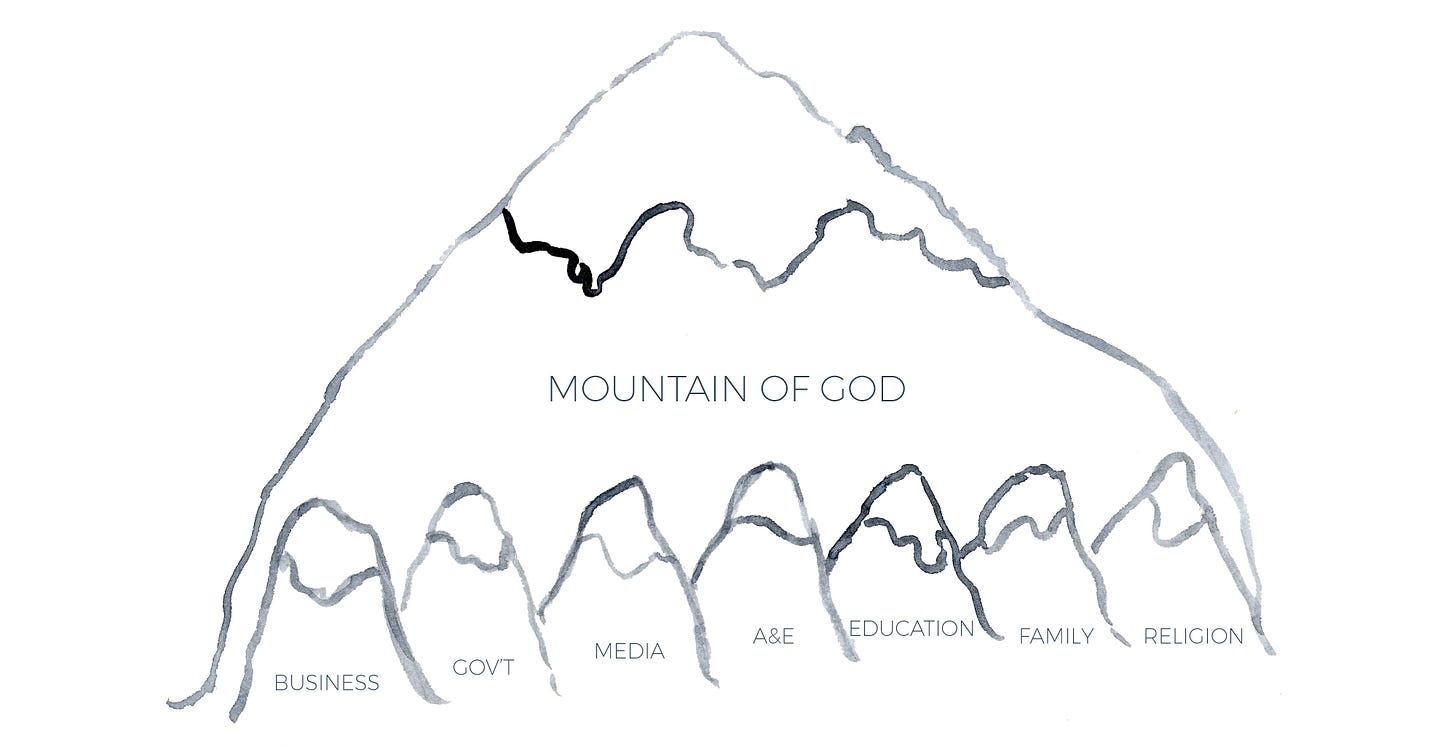
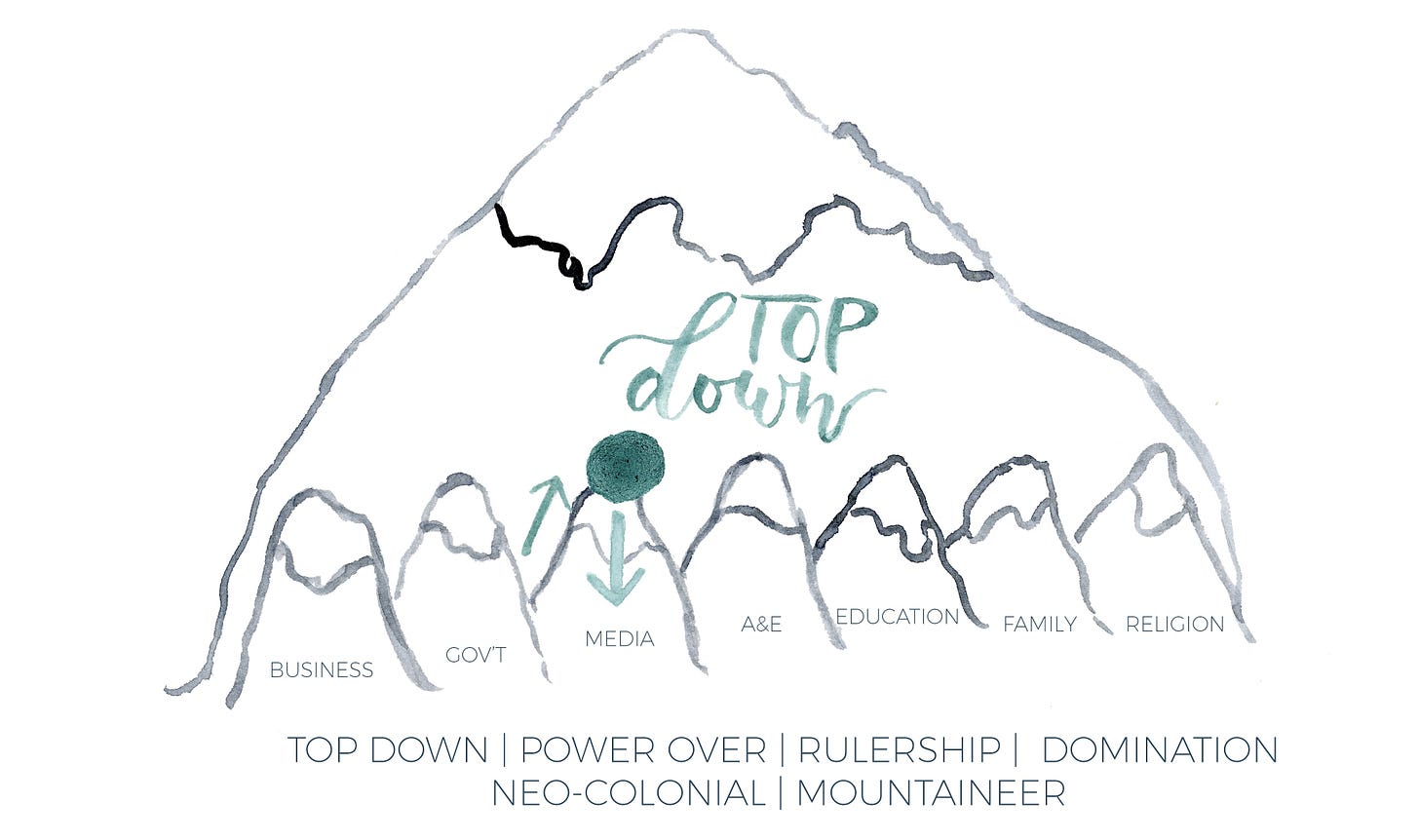
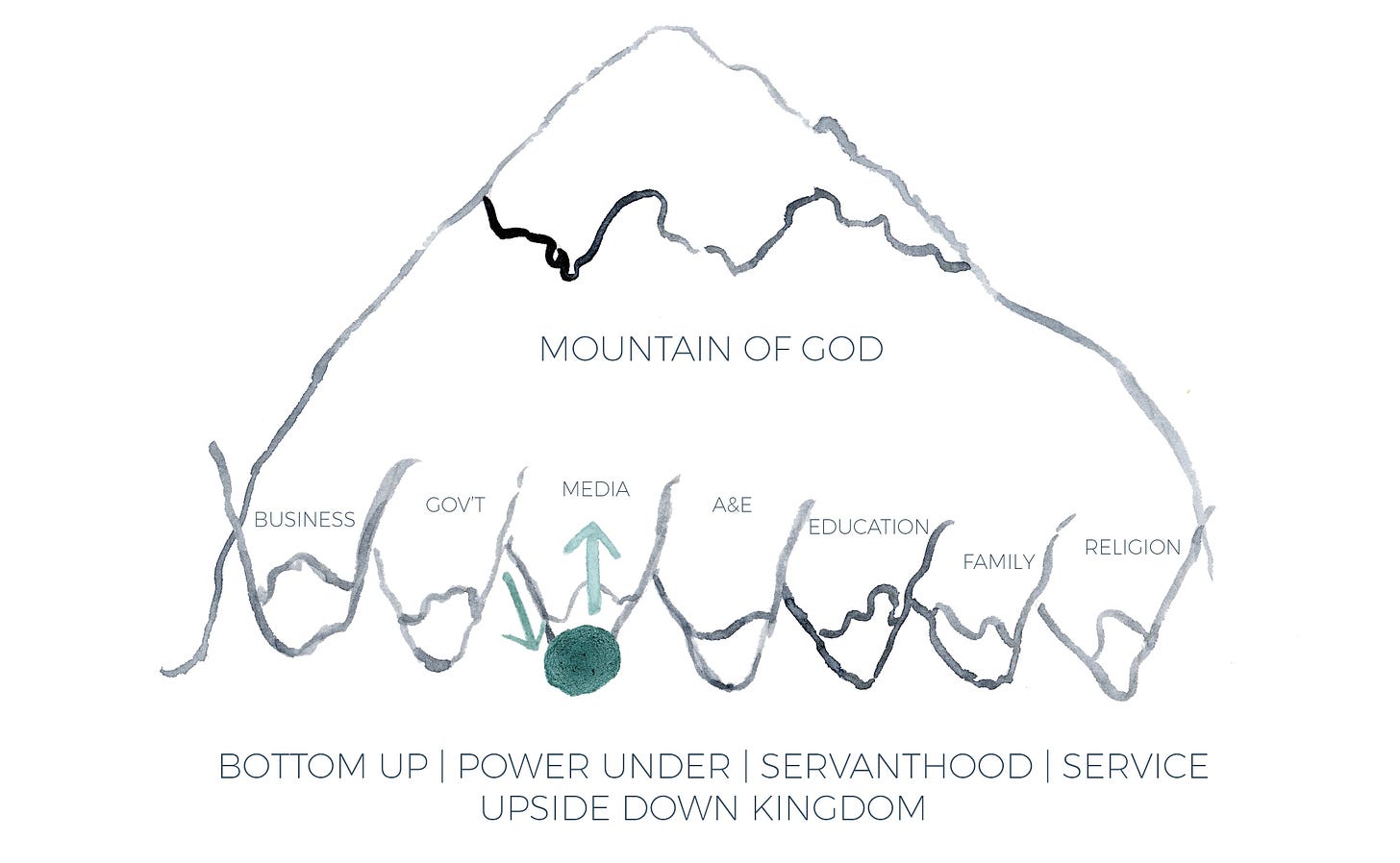
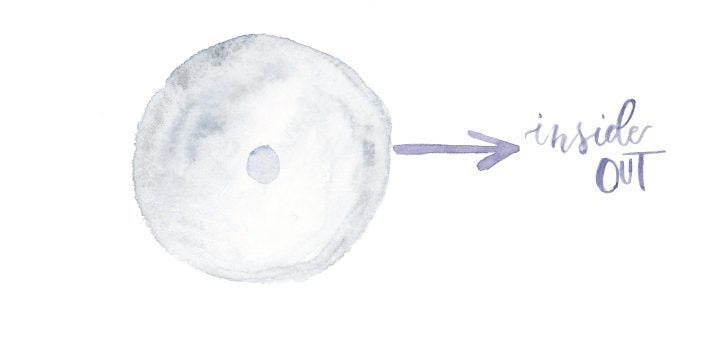
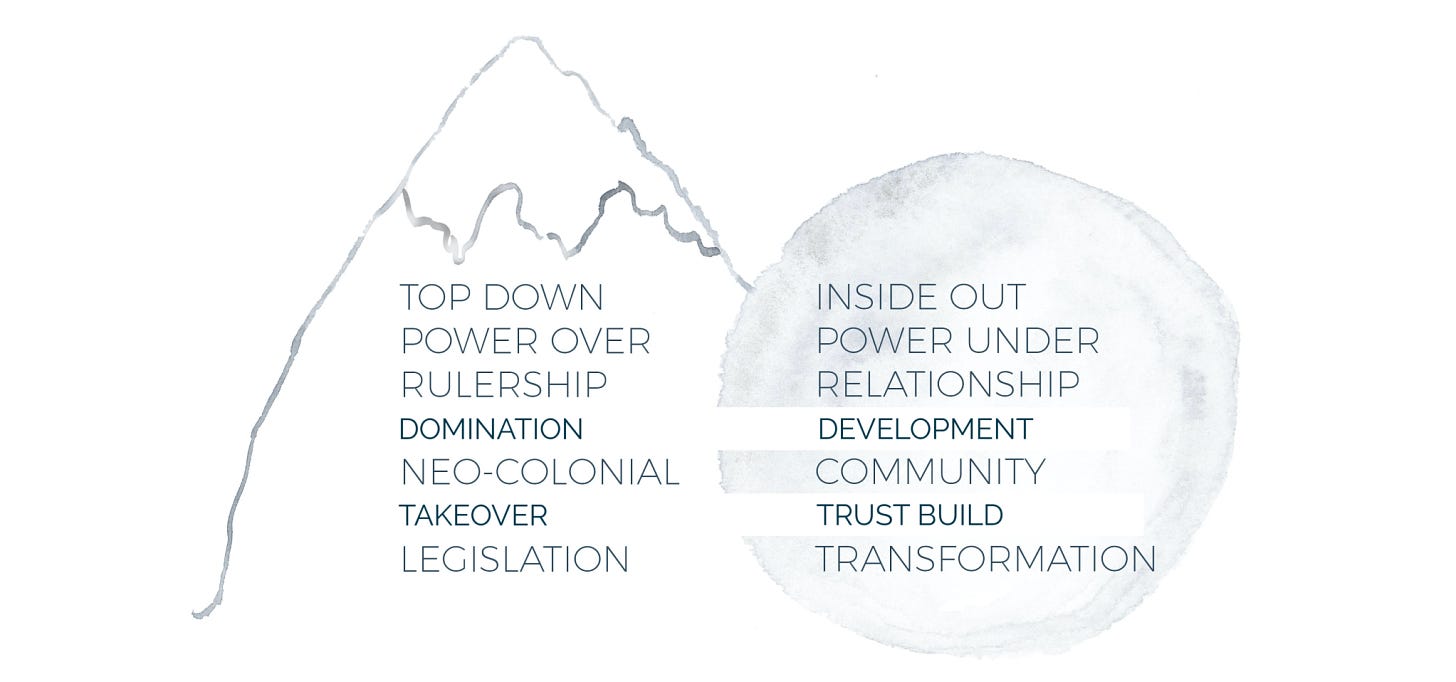

Somehow you were able to get inside my head and take the wad of tangled thoughts that have been building up in there for the past 8 years and make sense of them in profound, meaningful imagery and sentences. I am so grateful to find you!
I appreciate your thoughts about this so much. I don't have the words to express it. Thank you. ❤️❤️❤️🙏❤️